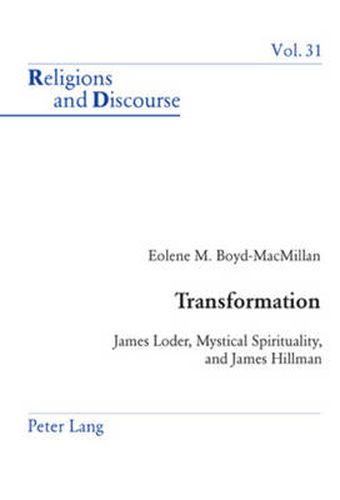Readings Newsletter
Become a Readings Member to make your shopping experience even easier.
Sign in or sign up for free!
You’re not far away from qualifying for FREE standard shipping within Australia
You’ve qualified for FREE standard shipping within Australia
The cart is loading…






This title is printed to order. This book may have been self-published. If so, we cannot guarantee the quality of the content. In the main most books will have gone through the editing process however some may not. We therefore suggest that you be aware of this before ordering this book. If in doubt check either the author or publisher’s details as we are unable to accept any returns unless they are faulty. Please contact us if you have any questions.
Transformation is a desired outcome of Christian spirituality. Christians pray, trust, and hope that their responsive embrace of God will transform them. Interdisciplinary study of this process, as journey and as significant movements, hits upon key philosophical, theological, and psychological debates. Are all spiritualities the same core with an overlay of traditional practices and beliefs? How is the Holy Spirit involved in human life as the potential for this transformation process unfolds from birth? Can psychological theories of transformation that do not affirm divine reality have explanatory and descriptive power for Christian understandings of transformation?
These areas of focus and related questions encompass broad landscapes. This book places a magnifying glass on one piece of the terrain by engaging the work of philosopher, theologian, and psychologist James Loder, mystical spirituality scholars Andrew Louth, Bernard McGinn, Denys Turner, and Mark McIntosh, and archetypal movement founder James Hillman. Without denying differences, this work is the first analysis to identify connections among these thinkers. The significance of the connections is both substantive and methodological for intra- and inter-faith (broadly understood) spirituality discussion, as well as for the engagement of the Christian church with the culture of the twenty-first century.
$9.00 standard shipping within Australia
FREE standard shipping within Australia for orders over $100.00
Express & International shipping calculated at checkout
This title is printed to order. This book may have been self-published. If so, we cannot guarantee the quality of the content. In the main most books will have gone through the editing process however some may not. We therefore suggest that you be aware of this before ordering this book. If in doubt check either the author or publisher’s details as we are unable to accept any returns unless they are faulty. Please contact us if you have any questions.
Transformation is a desired outcome of Christian spirituality. Christians pray, trust, and hope that their responsive embrace of God will transform them. Interdisciplinary study of this process, as journey and as significant movements, hits upon key philosophical, theological, and psychological debates. Are all spiritualities the same core with an overlay of traditional practices and beliefs? How is the Holy Spirit involved in human life as the potential for this transformation process unfolds from birth? Can psychological theories of transformation that do not affirm divine reality have explanatory and descriptive power for Christian understandings of transformation?
These areas of focus and related questions encompass broad landscapes. This book places a magnifying glass on one piece of the terrain by engaging the work of philosopher, theologian, and psychologist James Loder, mystical spirituality scholars Andrew Louth, Bernard McGinn, Denys Turner, and Mark McIntosh, and archetypal movement founder James Hillman. Without denying differences, this work is the first analysis to identify connections among these thinkers. The significance of the connections is both substantive and methodological for intra- and inter-faith (broadly understood) spirituality discussion, as well as for the engagement of the Christian church with the culture of the twenty-first century.